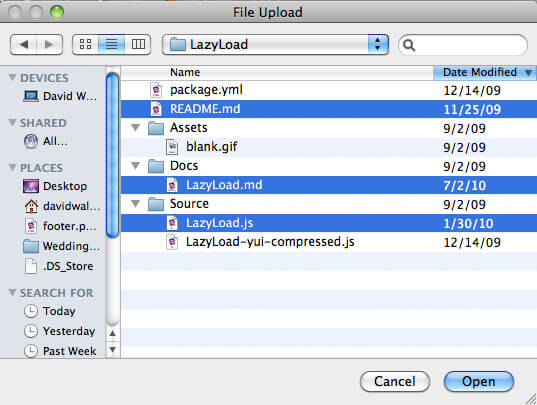Giveaway: O’Reilly Fluent Conference in San Fransisco
A winner has been drawn but you can still click here and use code AFF20 to get 20% off!
I've been a huge fan of open source and the open web, so it probably wouldn't surprise you that I work for Mozilla. Mozilla has pushed the "open web" philosophy since the organization's inception and has continued that philosophy to present day, now pushing to bring open web platform phones (Firefox OS) to developing nations.
O'Reilly's Fluent Conference, taking place in San Fransisco on April 20-22, is awesome because its topic is just that: the web platform. Fluent will bring you well known speakers in the HTML, JavaScript, and CSS arenas, including a few of my friends:
- Andreas Gal, Mozilla CTO
- Brendan Eich, Creator of JavaScript, Mozilla Founder
- Kyle Simpson, JavaScript legend, frequent guest author
- Paul Irish, Google, jQuery
- Raymond Camden, IBM
- Elijah Manor, jQuery
- ...and a host of other awesome speakers
The lineup of speakers is outrageous, to be honest. And the web platform? The best topic to learn about!
Free Ticket!
Want to win a free ticket to this amazing conference? In the comments section below, leave a comment (with your real email address) about why you believe the web platform (as opposed to native) is important! That's all you need to do!
20% Code: AFF20
If you don't want to chance not winning the free ticket, you can sign up with coupon code AFF20 to enjoy 20% off the full ticket price. Awesome discount on a premiere web conference.
Good luck and check your email within the next week to see if you've won!






Although native allows you get get specialized and specific for the device you are using, it doesn’t hold a candle to the web platform. I deal with ecommerce sites everyday and the one thing we find clients want, according to their customers, is familiarity. Sure your mobile app is slick, but if I can’t find the same information I can on the site in a reasonable amount of time, I don’t want to use it. Plus, I have to know you have an app and download it…with the web I can just go there like normal. Given time, I’m sure that one of two things will happen: the web platform will become more native-like or apps will share more with their web brethren.
Not too long ago, the idea that applications, documents and other personal data could be accessible across multiple devices was a luxury. This ‘feature’ has quickly become an expectation. Users are no longer willing to re-learn applications or re-enter information across their devices–and they shouldn’t be! The web platform is essential in assuring users have a seamless, productive experience without worrying about “whether they are using a Mac, or a PC; an iPhone or an Android phone.”
In addition to giving users a great experience, the web platform has become the universal ‘language’ of software development. Regardless of the language or framework you prefer, HTML/CSS and JS are now essential to almost all software projects. JavaScript has exploded as a result and learning HTML/CSS is cool now (it’s not just for designers!).
The web platform FTW!
Mobile vs Web is all about mastering the device that users want next. Mobile apps could work, but are klunky and tough to perfect. So developing for any and all devices is the future and having a language that has that diversity is key. The future of the web is here. And I am so excited
Native App guy: Wouldn’t it be nice to load your apps without a full install, then update these apps whenever we add new features and have the apps work on almost all internet enabled devices.
Web guy: Yeah that would be cool! but… isn’t that called a website?
There is so much to love about web technologies. Sharing experience, sharing knowledge, crossing cultural and geographic boundaries with the free flow of information: these things are improbable without the Internet to tie it all together. Any business, no matter how small, can have a global, public face, and that to me is amazing all on its own. People who have never met before can collaborate on a project that improves the lives of people they have never met before, thereby inspiring more to do the same! It is a platform for consumers, creators, businesses, individuals, and organizations. It makes our world smaller by making our communication within and knowledge of it greater. And it continues to make its way onto more devices every year.
It is an exciting time to be working with the web platform!
Nowadays web platform has native app like features and more. The browser shall stay irrespective of devices/platforms.
The web is bigger than any single corporate entity. It’s built on collaboration. Every day I use frameworks, libraries, language and browser features, etc. that were created by passionate people around the world. I love contributing to that. It makes me excited to learn and to share. The web is human.
I think its important to make the webplatform as native as possible but so much easier and at the same time more dynamic and i think the community is on a very good way to reach these goals.
In a near future Companies should be able to only have to develop and sell 1 App of every of their Products (not 1 for every OS and 1 for every Browser and device-type or stuff like that (phone/tablet)) the same for the client side, the web-page we open in a tablet or smartphone browser should be able to persist like a native app on the device or vice-versa.
In my opinion whats “important” is getting as simple and flexible as possible and not oppose to native, projects like node-webkit, cordova/phonegap etc. should be embedded to html/javascript one day.. maybe its already possible with vms .. idk but imho thats the future..
The web is crucial because it transcends economic status, device, and location. You can access the web from a game console, smart phone, fridge, high-end computer, laptop, and everything in-between. That’s something native apps will never be able to do as quickly or as well. Native apps don’t have anything like the sense of community around the web. Long live the free and open web!
The web is awesome because you can do so much with web technology that transcends its own medium. You are not limited to modules that only work for the web, there is easy portability to other technologies that can run on native platforms too. I think that the ease at which you can develop so many things on the web is great, and those great things can be used almost anywhere else on so many devices. Aside from cool technology, the web community is like none other, and is free and accessible to almost anyone.
Put simply: the internet is mankind’s first opportunity to seamlessly chronologically record it’s own history in real-time.
You take away the barriers preventing us from learning about one another, you unshackle users’ access, you keep the message true to each origin; you strengthen us all collectively. Conversely, every obstacle to the open web is as detrimental as the burning of the library at Alexandria: we’ll not know the impact it has immediately, but it will echo for eons.
My top three reasons are:
1. lower overall cost to maintain a common code base with common standards.
2. consistency in look, feel, branding, and experience across all platforms.
3. people not wanting to download platform-specific apps if they don’t have to is the prevailing trend.
The collective wisdom of the people working on the web will always result in greater achievements than those working on a proprietary platform.
History has proven Brendan Eich right.
http://alwaysbetonjs.com/ Enough said…
The web is like a public park, apps are like a exclusive private club
accessible, open source, archival.
The web has become more than a critical communication tool, it also gives new life to those whom would otherwise be isolated. The web platform itself is important in that it can reach the most people on the most devices in an open and agnostic (mostly) manner.
I think technologies like web components will be key to making a thriving web platform ecosystem. It will easier to rapidly create apps that are accessible now, and in the near to distant future.
Ubiquity, Accessibility, and Cost Efficiencies make the web indispensable. However, going forward both the web and the native have distinct important roles to play. While the native flavors can serve as the-experience-layer providing the richness of a service or a product, the web platform is critical to serve as the-base-delivery-layer to extend the services to the commons.
I’ve been a proponent of the open web since around 1997. Similar to Java’s beginnings being a “Write once, run anywhere” platform I saw the Web being exactly the same. PC? Mac? Unix? Linux? BSD? etc. yeah – everyone is welcome and everyone can and should be able to play at the same level.
In every Web development roll I’ve taken since starting I’ve had a strong stance to ensure cross-OS, cross-browser (and nowadays cross-device) compatibility.
I currently “Live, Eat, Breathe JavaScript” and test on every device I can get my hands on (including Firefox OS!)… and I wouldn’t have it any other way!
The open web platform is important over native due to the consistent, exponential reach that it will continually have. Considering the latest HTML API’s (e.g. fetch, notifications, animations) one can only see the continued structuring of web-based applications. You do lose some of the device specific access – and for those niche applications, native may be required – but the reach and efficiency at which you can affect the experience of your target audience will always lean towards the strength of the open web.
Web platform is a border-less world. FREEDOM!!!!
Simple. The open web isn’t owned by anyone.
I would prefer web apps vs native apps for the following reasons:
1. Release cycle. A web app has a much quicker turnaround to add features, fix bugs. For example, you could use an agile system and release a new feature weekly.
On the contrary, a native app has a much longer release cycle. The user needs to install the update and you do not want to do this very often. The release cycle is usually two to three months.
2. Easy to maintain the code base. For web apps the code base between the www and the mobile web site is very similar.
3. The web technologies and frameworks are constantly evolving which makes it more interesting for web developers to work on web apps.
* The web is open for everyone on all platforms. You don’t have to choose between Mario and Master Chief.
* Linking/Hypermedia is the killer feature.
* Building anything on the web accommodates beginners as well as experts – View Source.
* No one entity controls the platform.
* Deploying updates is better than needing users to download them.